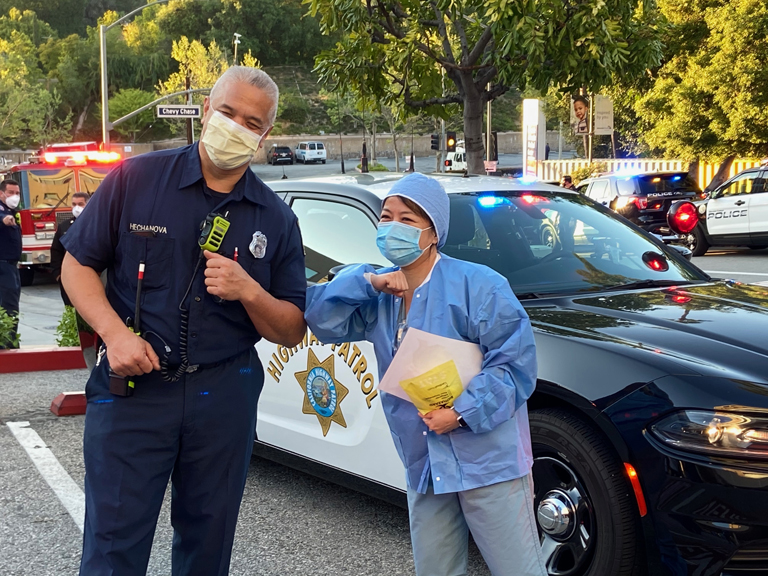
Law enforcement and medical professionals are entering 10 months of treating the community during the pandemic. Medical professionals especially need help to combat fatigue.
By Mary O’KEEFE
With the latest surge of COVID-19 infections and hospitalizations, medical staff at hospitals need the community’s support now more than ever.
“We are in crisis mode currently,” said Donovan Stewart, associate chief nursing officer at Adventist Health Glendale. “The [Emergency Department] is at [maximum] capacity.”
The ICU is also well over 100% capacity.
“There is no wiggle room,” he added.
Some patients who come into the ED are being treated in tents because capacity has been reached, not only at Adventist but also at just about every hospital in Los Angeles County.
CVW reached out to ask what readers could do to help support the medical staff.
“The number one thing people can do to help is to follow the safety guidelines,” Stewart said. “Wear a mask, wash your hands and [practice] social distancing.”
The toll on medical staff and front line workers has been intense as they are now in the 10th month of boots-on-the-ground, non-stop COVID-19 response. Even though many have performed drills in the past to respond to emergencies like a pandemic and have in fact responded to other pandemics nothing prepared them for the current medical situation.
“It is unimaginable. Everyone is so burned out. We have been dealing with this for the past 10 months,” Stewart said.
After taking care of patients with COVID-19 in addition to meeting the needs of other patients the workers take home these burdens. Like everyone dealing with COVID-19 restrictions, they must also tend to children who are learning virtually, and dealing with elderly and high-risk family members and/or spouses who have lost their jobs.
When asked what people can do to help Stewart said that food is always appreciated. Often the staff does not leave the hospital during their shift so bringing lunch or dinner to the hospital is of great help.
And PPE [Personal Protective Equipment] is also appreciated.
“During the first wave we had a lot of businesses donate food for the staff,” said Ron Yolo, chief nurse at Dignity Health, Glendale Memorial Hospital and Health Center.
For example, in the past people and businesses had an In ‘N’ Out truck come to the hospital when over 500 meals were donated for staff.
USC Verdugo Hills Hospital has a food “meal train” set up for its staff. This was appreciated and reminded staff that they are not alone or forgotten.
Another way Stewart said the community could help would be for counselors or therapists to donate their services virtually for those who needed to talk.
For anyone who would like to donate to these hospital contact:
Glendale Memorial Health Foundation, visit supportglendale.org or call (818) 502-2375. For food donations to Adventist Health Glendale, call (818) 409-8524 or email daniel.Harrison@sodexo.com or visit www.adventisthealth.org/glendale/our-foundation for other donation opportunities.
For the USC Verdugo Hills Hospital meal train, visit www.mealtrain.com/trains/nn5z0d.
For more information, visit uscvhh.org or call (818) 790-7100.
